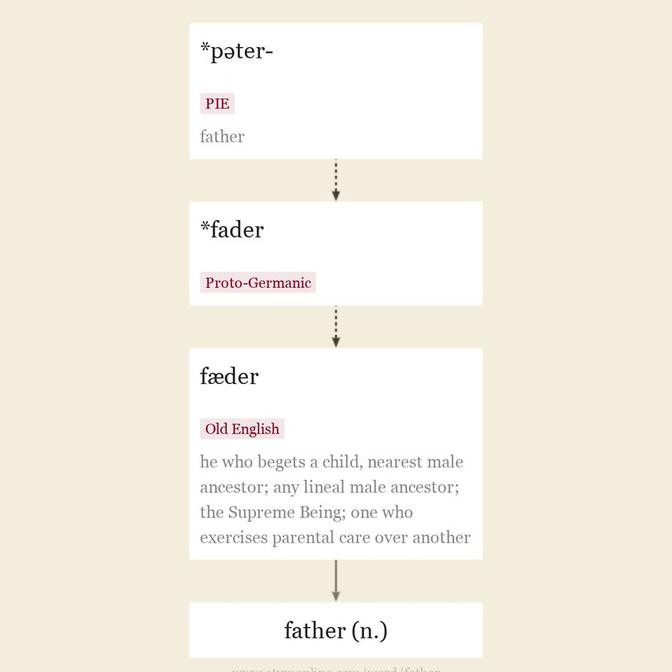Entries linking to forefather
Middle English fader, from Old English fæder "he who begets a child, nearest male ancestor;" also "any lineal male ancestor; the Supreme Being," and by late Old English, "one who exercises parental care over another," from Proto-Germanic *fader (source also of Old Saxon fadar, Old Frisian feder, Dutch vader, Old Norse faðir, Old High German fatar, German vater; in Gothic usually expressed by atta).
This is from the PIE root *pəter- "father" (source also of Sanskrit pitar-, Greek pater, Latin pater, Old Persian pita, Old Irish athir "father"), which is presumably from baby-speak sound "pa." The ending formerly was regarded as an agent-noun affix. The classic example of Grimm's Law, where PIE "p-" becomes Germanic "f-."
The spelling with -th- (15c.) reflects a widespread phonetic shift in Middle English that turned -der to -ther in many words, perhaps reinforced in this case by Old Norse forms; the spelling caught up to pronunciation in 1500s (compare mother (n.), weather (n.), hither, gather).
As a title of various Church dignitaries from c. 1300; the meaning "creator, inventor, author" is from mid-14c.; that of "anything that gives rise to something else" is from late 14c. As a respectful title for an older man, recorded from 1550s. Father-figure is from 1954. Fathers "leading men, elders" is from 1580s.
My heart leaps up when I behold
A rainbow in the sky:
So was it when my life began;
So is it now I am a man;
So be it when I shall grow old,
Or let me die!
The Child is father of the Man;
I could wish my days to be
Bound each to each by natural piety.
[Wordsworth, 1802]
Proto-Indo-European root forming prepositions, etc., meaning "forward," and, by extension, "in front of, before, first, chief, toward, near, against," etc.
It forms all or part of: afford; approach; appropriate; approve; approximate; barbican; before; deprive; expropriate; far; first; for; for-; fore; fore-; forefather; foremost; former (adj.); forth; frame; frau; fret; Freya; fro; froward; from; furnish; furniture; further; galore; hysteron-proteron; impervious; improbity; impromptu; improve; palfrey; par (prep.); para- (1) "alongside, beyond; altered; contrary; irregular, abnormal;" paradise; pardon; paramount; paramour; parvenu; pellucid; per; per-; percent; percussion; perennial; perestroika; perfect; perfidy; perform; perfume; perfunctory; perhaps; peri-; perish; perjury; permanent; permeate; permit; pernicious; perpendicular; perpetual; perplex; persecute; persevere; perspective; perspire; persuasion; pertain; peruse; pervade; pervert; pierce; portray; postprandial; prae-; Prakrit; pre-; premier; presbyter; Presbyterian; preterite; pride; priest; primal; primary; primate; primavera; prime; primeval; primitive; primo; primogenitor; primogeniture; primordial; primus; prince; principal; principle; prior; pristine; private; privilege; privy; pro (n.2) "a consideration or argument in favor;" pro-; probably; probe; probity; problem; proceed; proclaim; prodigal; produce; profane; profess; profile; profit; profound; profuse; project; promise; prompt; prone; proof; proper; property; propinquity; prophet; prose; prostate; prosthesis; protagonist; Protean; protect; protein; Proterozoic; protest; proto-; protocol; proton; protoplasm; Protozoa; proud; prove; proverb; provide; provoke; prow; prowess; proximate; Purana; purchase; purdah; reciprocal; rapprochement; reproach; reprove; veneer.
It is the hypothetical source of/evidence for its existence is provided by: Sanskrit pari "around, about, through," parah "farther, remote, ulterior," pura "formerly, before," pra- "before, forward, forth;" Avestan pairi- "around," paro "before;" Hittite para "outside of," Greek peri "around, about, near, beyond," pera "across, beyond," paros "before," para "from beside, beyond," pro "before;" Latin pro "before, for, on behalf of, instead of," porro "forward," prae "before," per "through;" Old Church Slavonic pra-dedu "great-grandfather;" Russian pere- "through;" Lithuanian per "through;" Old Irish ire "farther," roar "enough;" Gothic faura "before," Old English fore (prep.) "before, in front of," (adv.) "before, previously," fram "forward, from," feor "to a great distance, long ago;" German vor "before, in front of;" Old Irish air- Gothic fair-, German ver-, Old English fer-, intensive prefixes.
Trends of forefather
More to Explore
updated on September 28, 2017
Trending words
Dictionary entries near forefather
forecasting
forecastle
foreclose
foreclosure
fore-deck
forefather
forefend
forefinger
forefront
forego
foregoing

